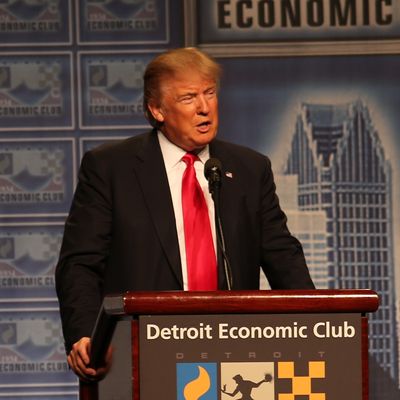
The U.S. stock market, seven years into an almost nonstop bull run, went on a wild ride last week: The Dow Jones Industrial Average swung between 100 and 200 points — up one day, down the next — on four separate days. There hasn’t been such a bout of volatility since late June, when the U.K.’s surprise vote to exit the European Union sent markets on a roller-coaster ride. Volatility is not just apparent in the stock market either. Wall Street strategists say it’s also cropping up in the bond and foreign-exchange markets.
Global markets are jittery about many things right now, but one fear seems to override all others: The polls in the presidential race have suddenly tightened, and Donald Trump might actually become president of the United States of America — with unknown, but possibly very negative, implications for everything from trade policy to foreign relations to monetary policy.
In short, a Trump presidency is the very definition of what markets hate: uncertainty. “Trump is widely considered to be reckless and Clinton is widely considered to be a friend to Wall Street,” explains Chris Irons, an analyst with the equity research firm GeoInvesting. “In terms of which of the two would shoot volatility into the market, he is clearly it.”
Société Générale analysts call it the “Trump factor.” They argue that the tightening of the polls between Trump and Clinton is a big reason for a sell-off in global bonds in September, which has led to the unease in equity markets, Bloomberg reported on Tuesday. Rates on both long-term Treasury and Japanese bonds have been rising since the polls started tightening, SocGen says.
A tightening of the race is normal, and might seem inevitable after the huge lead Clinton took following the Democratic National Convention and the Khizr Khan affair. But investors seemed to start selling when Trump took the lead in the crucial swing states of Ohio and Florida. Now, FiveThirtyEight gives Clinton a mere 57.6 percent chance of victory. On September 10, before she was caught on video stumbling into a car in what some are calling “pneumoniagate,” it was 70 percent.
In general, markets prefer a Clinton victory. In a new CNBC survey of economists, fund managers, and strategists, 53 percent think Clinton is better for the stock market than Trump — because she’s a known quantity, and a person whose ability to relate to foreign leaders is comforting. Only 26 percent of those surveyed think Trump is better for stocks, down from 32 percent the prior month. Some market prognosticators have suggested a win by Trump could send the stock market down at least 10 percent.
“I don’t know what the U.S. dollar is worth with a Trump victory. I don’t know what it does to foreign flows into the U.S.,” says Josh Brown, CEO of financial adviser Ritzholtz Wealth Management. “Are foreign corporations as desirous of owning US dollars with someone so erratic in the White House?”
Trump’s economic plans, as outlined in a September 15 speech before the Economic Club of New York, earned praise from some business executives for his call for lower taxes and looser regulations on business, typical Republican talking points. But the concern on Wall Street is whether or not Trump knows what he is talking about — or even cares. In recent weeks, for example, he has been bashing Fed Chair Janet Yellen, blaming the Fed for creating a “false economy” and an “artificial stock market” in an interview with Reuters, saying the Fed needs to raise rates. But Trump also says the economy is a disaster. “Which is it?” asks Brown, noting that if the economy is truly a disaster, rates would need to stay low. (Trump also changes his mind a lot, which Wall Street doesn’t like. This spring, he said raising rates would be “scary.”)
Wall Street economists have long warned that a Trump presidency could increase the chances for a recession. In an August 25 research note, Citigroup chief economist Willem Buiter wrote that “a Trump victory could prolong and perhaps exacerbate policy uncertainty and deliver a shock (though perhaps short-lived) to financial markets. Tightening financial conditions and further rises in uncertainty could trigger a significant slowdown in U.S., but also global growth.” This week, Citi said that the chances of Trump becoming president are more real than most people think.
To some on Wall Street, greater volatility is okay. To others, not so much. “I was at a party on Long Island this weekend, and a lot of the hedge fund guys there are backing Trump and they love the volatility,” says Brown. As traders, they can profit going long and short, sometimes at the same time. But the bankers at the party had a more sober view, he said, telling him, “When you lay out the possibilities of what can happen with Clinton, it’s far more predictable. When you lay out what could happen with Trump, we could be at war with Canada.”





























